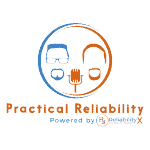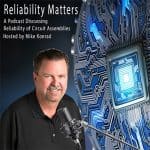
Reliability Planning and Maturity
Abstract
Carl and Fred discussing the importance of considering the capability of a company from a reliability point of view and developing the tasks in a reliability plan.
ᐅ Play Episode
Your Reliability Engineering Professional Development Site

Carl and Fred discussing the importance of considering the capability of a company from a reliability point of view and developing the tasks in a reliability plan.
ᐅ Play Episode
by Robert Kalwarowsky Leave a Comment

Welcome to Rob’s Reliability Project, I’m Rob Kalwarowsky. On this week’s episode I welcome on Howard Penrose to talk about electrical signature analysis. Howard is the president of MotorDoc and a past chair of the Society of Maintenance & Reliability Professionals. We discuss electric motors, the similarities and differences between ESA and vibration analysis and Howard gives us his tips on passing the CMRP exam.
If you haven’t yet, check out robsreliability.com and sign up for the newsletter, subscribe to Rob’s Reliability Project on your favorite podcast platform and tell your colleages about the podcast.
I have released my own reliability, maintenance and asset management coaching, consulting and professional services offerings, check out robsreliability.com for more information and if I can help you become a better reliability engineer or your company achieve it’s reliability goals, please email me at robsreliabilityproject@gmail.com. I look forward to working with you.
In addition, if your company sells products or services to maintenance, reliability and asset management professionals and you would be interested in having your message spread to engaged industry professionals, tell your marketing manager about Rob’s Reliability Project. There are advertising options available from appearing on the podcast, video/picture content to having an ad read on the show. If one of those appeals to your company, email me at robsreliabilityproject@gmail.com to get more information.
If you haven’t signed up for my weekly reliability newsletter with extra exclusive content, go to http://robsreliability.com/email-list/ and sign up!
Check out http://robsreliability.com/
Follow Howard Penrose on LinkedIn – https://www.linkedin.com/in/motordoc/
Follow Rob’s Reliability Project on LinkedIn – https://www.linkedin.com/company/robsreliabilityproject

Whenever there’s a problem in the plant, it always comes to finding the root cause if you are looking to solve it and stop it from reappearing later on. To successfully do that, you need to have what’s going on with your plant. You should have the complete understanding of the processes and the events that might have led to that issue in the first place. It isn’t always a single root causes that results into a failure. It can be a number of small things that contribute to that problem and result in a failure. So, there can be multiple causes for a single problem.
In this episode, we covered:
by George Williams Leave a Comment

Ryan discusses what separates Upkeep from other CMMS solutions, the keys to system utilization, and the process of selecting and implementing a CMMS solution.
[Read more…]

Kirk and Fred discuss whether reliability testing is necessary or not.
ᐅ Play Episode
by Tim Rodgers Leave a Comment

Tim Rodgers interviews Mike about circuit board cleaning systems.
ᐅ Play Episode
by Fred Schenkelberg Leave a Comment

When we make a measurement, we make a decision based on the data provided. It’s important to have data close enough to the actual measurement. What is the measurement error if something is supposed to be 2 cm long and we measure it at 2.1 cm?
[Read more…]
by Christopher Jackson 2 Comments

MTBF stands for ‘mean time between failure.’ This sounds intuitively easy to understand. But … if you haven’t taken the time to understand MTBF, and your organization relies on the reliability of its products, you are almost certainly in trouble. [Read more…]

Kirk and Fred discussing what it takes to really make industry-wide changes.
ᐅ Play Episode
by Robert Kalwarowsky Leave a Comment

This week I’m joined by Suzane Greeman to discuss asset management and why your business processes are holding you back from achieving your reliability goals.
If you haven’t yet, check out my website robsreliability.comand sign up for the weekly reliability newsletter with bonus exclusive content.
Finally, if there are any topics, guests you’d like to hear from, questions you want answered, or if you’d like to appear on the podcast, email me at robsreliabilityproject@gmail.com
If you haven’t signed up for my weekly reliability newsletter with extra exclusive content, go to http://robsreliability.com/email-list/ and sign up!
Check out Greeman Asset Management Solutions – https://greemanassetmanagementsolutions.com/
Check out Rob’s Reliability – www.robsreliability.com
Follow Rob’s Reliability Project on LinkedIn – https://www.linkedin.com/company/robsreliabilityproject/
Follow Rob’s Reliability Project on Facebook – https://www.facebook.com/robsreliabilityproject/
by Mike Konrad Leave a Comment

My guests today are two of the people behind Anders, a UK-based company which manufactures displays and embedded control systems. Anders manufactures display and embedded controller products for a variety of industries including medical, marine, industrial, home, and much more. My guests are Ander’s General Manager, Paul Mullen and Display and Input Technology Manager, Mike Logan. Both Paul and Mike spoke with me from their London headquarters. Anders website is https://www.andersdx.com
by James Kovacevic Leave a Comment

Reliability and Maintenance industry changes very fast. The organization always enlist the help of consultants when their assets are failing. The reason why it doesn’t work sometimes is because the companies don’t know what they are looking for. Before you go about hiring some consulting firm, you need to have some certain information for them to begin with. Once you know what the problem is and what is it that you are trying to accomplish, it becomes easier for consultants to help you with overcoming failures and stopping them in the first place. You have to understand where you are at? What kind of problems are you facing?
In this episode, we covered:
by Christopher Jackson Leave a Comment

Chris and Fred discuss what happens when you have failure … but don’t know why. This is a challenging problem that most reliability engineers will face throughout their career. You will always need to use an objective, structured and strategic approach. And you will often find that a lot of information is at your fingertips – you may be able to create a very short list of candidate root causes without having to test. Effort without direction won’t solve problems. If you want to learn more about solving this really challenging problems, then listen to this podcast.
ᐅ Play Episode
by George Williams Leave a Comment

Calvin shares his insights on improving manufacturing performance, the skills trades gap, and how his solution, Impruver, helps driver results through the PDCA cycle.
[Read more…]

Adam and Fred discussing the different types and intents of reliability and environmental testing
ᐅ Play Episode
 Ask a question or send along a comment.
Please login to view and use the contact form.
Ask a question or send along a comment.
Please login to view and use the contact form.